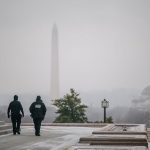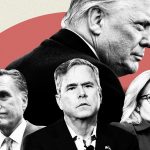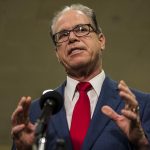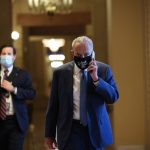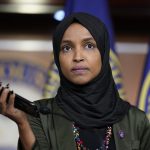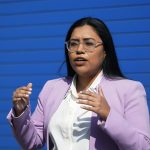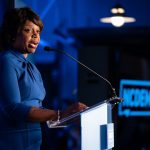PGA Tour officials faced their first public questioning Tuesday since their controversial agreement with Saudi-backed LIV Golf, repeatedly asserting the deal was essential to the survival of professional golf.
If LIV Golf had managed to snag five players annually, then “they can gut us,” said Jimmy Dunne, board member of the PGA Tour who has been credited with sealing the deal.
Democratic senators particularly weren’t sold, accusing the executives of enabling Saudi Arabia to “sportswash” its human rights abuses. And they made little secret that they felt PGA Tour officials were motivated primarily by greed.
“What happened that led the PGA Tour to change its position? Was it only the hope of ending litigation?” Sen. Richard Blumenthal (D-Conn.) asked at the start of the hearing. “There is something that stinks about this path that you’re on right now because it is a surrender. And it is all about the money and that’s the reason for the backlash that you’ve seen.”
The hearing marks the most visible action from Congress since the early June announcement of the deal sparked bipartisan pushback among lawmakers, though some Republicans in the Tuesday hearing questioned Congress’ role in the private business deal. Blumenthal launched his own probe of the agreement, while other lawmakers have urged strict Justice Department scrutiny for possible antitrust violations and offered legislation to end the PGA Tour’s tax-exempt status.
During the hearing, Blumenthal released a trove of internal documents and talking points offering a glimpse into the negotiations between the two leagues. Those records revealed proposals to oust LIV Golf commissioner Greg Norman from his leadership role upon the completion of the deal, as well the addition of a “broad non-disparagement clause” by Saudi Arabia’s Public Investment Fund in late May.
The Connecticut Democrat said the investigation is ongoing and a host of details on the deal remain unknown. Norman made the rounds on Capitol Hill in September 2022, months before the announcement of the merger.
Dunne vowed in his testimony that he would not have pursued the deal if he had concerns with Saudi Arabia’s ties to the Sept. 11 attacks. He noted he lost more than five dozen employees in the attack on the World Trade Center.
“If any person had the remotest connection to an attack on our country and the murder of my friends, I am the last guy who would be sitting at a table with them,” Dunne said. “If this agreement ultimately succeeds, I have nothing to gain except a sense of pride that we have helped to unite the game we love.”
Both Dunne and Ron Price, chief operating officer of PGA Tour, said the Saudi-backed golf league posed an existential threat to the sport: “It’s only because of LIV that we’re sitting here today,” Price said.
Price testified the anticipated Saudi investment in the PGA Tour could be “north of $1 billion” if the agreement is ultimately completed.
Conspicuously absent from the hearing before the Senate Permanent Subcommittee on Investigations were the three original invitees. PGA Tour Commissioner Jay Monahan has been out on medical leave since shortly after the announcement of the agreement, while Norman and Yasir Al-Rumayyan, governor of the Public Investment Fund of Saudi Arabia, cited scheduling conflicts in declining to appear.
Blumenthal said he would continue to pursue testimony from those three officials and told reporters on Monday he would not rule out a subpoena if they ducked his panel completely. He added that he believes the LIV officials are cooperating in good faith.
The hearing touched on matters as varied as the Sept. 11, 2001 terrorist attacks, antitrust law, the murder of Jamal Khashoggi, human rights abuses and compensation of athletes. Among those observing the proceedings were some family members of those who perished in the Sept. 11, 2001 terror attacks, according to Blumenthal.
Not all Republican members believed the private deal was worthy of the congressional spotlight. Sen. Ron Johnson (R-Wis.), ranking member of the panel, said the proposed new league raised valid questions but questioned whether Congress should be involved.
“The parties are in the midst of what should be a private negotiation and there is no deal to review,” he said. “There is nothing wrong with the PGA Tour negotiating its survival. Negotiations are often delicate — mostly private — and I fear Congress getting involved at this stage could have negative consequences.”
Sen. Rand Paul (R-Ky.), top Republican on the Homeland Security and Governmental Affairs Committee who’s been sharply critical of U.S. policy toward Saudi Arabia, argued there was no role for Congress in scrutinizing the golf agreement and called it a “show trial, basically of a private organization.”
“I see no constitutional power that suggests Congress should involve itself in golf,” he said. “We have no business asking the PGA about their negotiations or what they might do or what they might [not] do. It’s not the business of government.”
Seeking to assure the senators who clearly did feel Congress had an oversight role, the executives promised that no players would be prevented from criticizing against Saudi Arabia’s human rights record.
“If we move from a framework agreement to a definitive agreement, our players will be freely able to speak about Saudi Arabia. The PGA Tour fully supports human rights,” Price said. “The only way we will move forward with a definitive agreement [is] if the PGA Tour is in complete control.”
